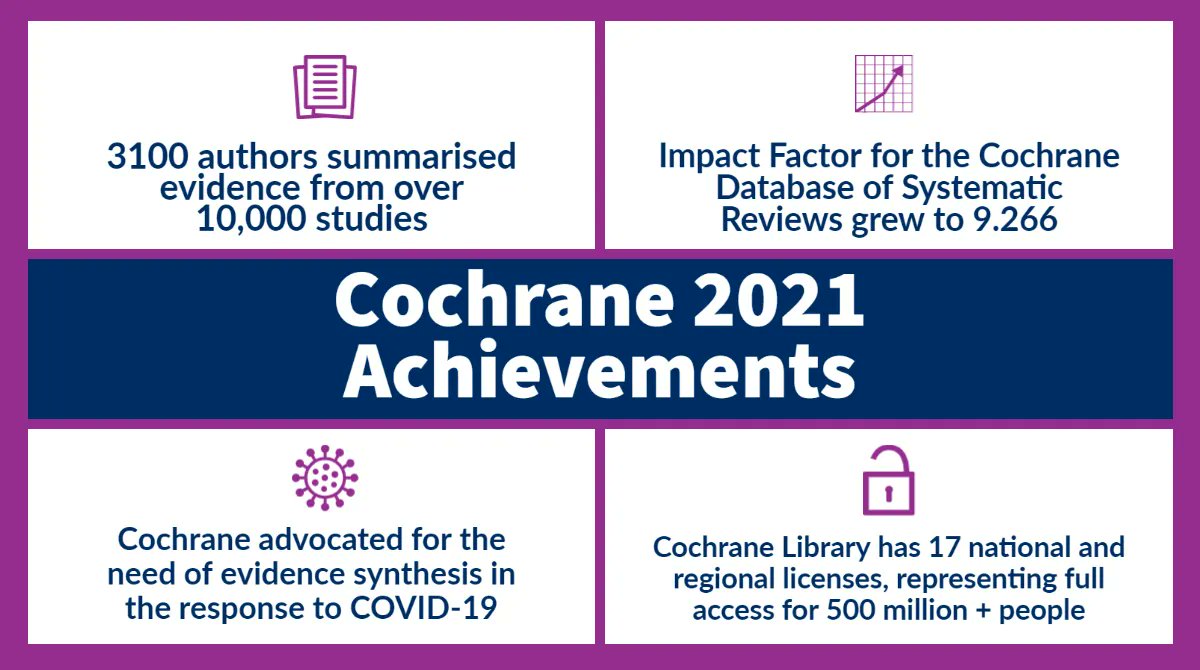
GOAL 1 Producing trusted evidence
- Impact Factor for Cochrane Database of Systematic Reviews grew to 9.266.
- In 2021,3100 authors prepared new and updated reviews by summarising evidence from over 10,000 included studies
- Among 18 Special Collections published in 2021, Cochrane has showcased content covering stillbirth prevention, brain tumours, physical activity in healthy ageing, and low value healthcare interventions.
- In 2021 we launched a programme of community engagement on the future of evidence synthesis production in Cochrane
- In addition to our 239 groups (54 countries), over 3600 Supporters and Members from 112 countries have volunteered with Cochrane in 2021
- Our top three most popular volunteer opportunities were screening studies in Cochrane Crowd, translating evidence into different languages and peer reviewing. To see our wide range of volunteer opportunities please visit TaskExchange.
- We have launched a new policy to improve research integrity by helping authors identify and manage problematic studies
- We rolled out RevMan Web with many new features including study-centric data, and support for methodology and overviews
- Cochrane Crowd passed 23,000 contributors and 6 million classifications of primary research
- We implemented the new editorial management system
- We implemented a publishing dashboard to monitor in near real time our content publication workflows and timelines for the Cochrane Library.
GOAL 2 Advocating for evidence
- We made statements at two World Health Assemblies - advocating for the need of evidence synthesis in the response to COVID-19
- We hosted a major advocacy event Cochrane Convenes: Preparing for and responding to global health emergencies: what have we learnt from COVID-19
- 90 healthcare policy makers, researchers, funders, journalists, science communicators and consumer representatives from around the world participated in seven roundtable discussions for Cochrane Convenes.
- Cochrane Convenes was led by Cochrane, co-sponsored by the World Health Organization (WHO), and co-organized with partners of COVID-END (COVID-19 Evidence Network to support Decision-making)
- Cochrane Groups (including Cochrane Austria, Cochrane Belgium, and others) continued their advocacy work for clinical trial transparency.
- Cochrane Convenes generated recommendations which will inform Cochrane's work in 2022, including its advocacy agenda. The recommendations were for:
-
Researchers: Identify tools, processes, methods, and research questions that can be developed in ‘peace-time’ to ensure better preparedness in future
-
Funders: Fund infrastructure and the entire process in LMIC as well as HIC, so that reliable and useful evidence can be generated quickly in response to the next global emergency
-
Policy-makers: Be transparent and develop understanding of scientific uncertainty and negative results and how to communicate about it
-
Politicians: Act on mis/disinformation by holding those intentionally creating and spreading mis/disinformation accountable - this threatens lives
-
GOAL 3 Informing health and care decisions
- All COVID-19 related reviews continued to be made free to access.
- 75% of all Cochrane Reviews are currently free to access globally.
- There have been around 14 million full text views of Cochrane Reviews, CENTRAL records and Cochrane Clinical Answers (CCAs), from over 230 countries
- over 50% of Cochrane Reviews produced during the last decade are used to inform English language Wikipedia articles
- The Cochrane Library now has a total of 17 national and regional licenses, representing immediate full access for more than 500 million people.
- Total number of unique visitors to the Cochrane Library grew in 2021 with 8m unique visitors by end of September 2021.
- 2021 user research shows that the Cochrane Library continues to excel in satisfaction, likelihood of future use and recommendations.
- PICO search and browse moved off beta on the Cochrane Library
- Usage of translated content on the Cochrane Library continued to grow in 2021.

Learning and support
- We ran an author experience survey to update on the findings from 2019. Overall, the authors who participated were pleased with their experience of workingwith Cochrane, the majority of them stating that they are satisfied with the overall experience as a Cochrane Author
- During 2021, we ran 11 webinars in our Learning Live programme reaching 3,096 attendees
- We launched Cochrane Evidence Essentials in German and Russian and released the 5th and final module in the course. Cochrane Editorial Essentials is our free online resource offering an introduction to health evidence, and how to use it to make informed health choices.
- We had over 500 participants on a single webinar for the first time during our first webinar in the Qualitative Evidence Synthesis series
- Cochrane membership continues to be strong with 13,046 currently
- We completely rebuilt Cochrane TaskExchange and in doing have improved the profile section (that is now synchronised with the profile in My Account) and added new options for email alerts to make the process of matching volunteers to tasks more efficient. We have exciting plans for further development of TaskExchange in 2022.
Organisational matters
- We launched the Strategy for Change based on community consultations and contributions
- We launched the Cochrane China and Cochrane India Networks
- We maintained a programme of virtual meetings and engagement to ensure our community continued to be able to connect
- We restructured the Central Executive Team (CET) to save money, to streamline the way we operated and integrate a focus on fundraising for the future
- We saved over £2m from the CET review and restructure, which will enable us to achieve breakeven in 2023
- We recruited three new Governing Board members, all under 30, and two Governing Board members were re-elected
